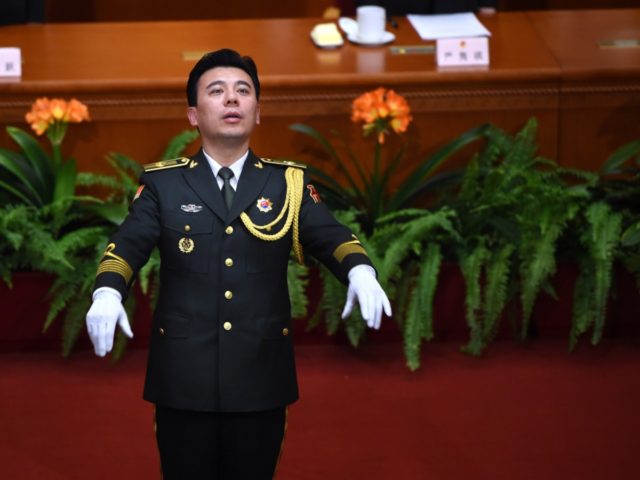The Hong Kong Legislative Council (LegCo) passed a law Thursday that could result in up to three years in prison for anyone found guilty of “disrespecting or misusing” the “March of the Volunteers,” the anthem of communist China.
Thursday is the anniversary of the 1989 Tiananmen Square massacres, in which Beijing murdered thousands of peaceful protesters seeking democracy. The Communist Party only admitted to the killings last year, the 30th anniversary of the event, and used the occasion to celebrate the use of deadly force on a crowd of unarmed students as “correct” policy.
Hong Kong’s Chinese-controlled government has been attempting to pass the bill for months, meeting fierce resistance from pro-democracy lawmakers and activists. Supporters insist the anthem is needed because protesters seeking to preserve autonomy from the Communist Party have refused to sing the anthem at public events or publicly booed it. Opponents insist that freedom of expression requires allowing Hongkongers the right not to express allegiance to the Party.
Under “One Country, Two Systems,” the policy that officially governs Hong Kong, China has sovereignty over Hong Kong and responsibility for its security against foreign threats. The policy nominally allows for Hong Kong to write its own laws on domestic issues, however, and maintain its decades-old tradition of respecting individual civil and political rights.
For the past year, Hong Kong residents have taken to the streets by the millions to protest a variety of measures by Beijing to undermine “One Country, Two Systems,” among them the national anthem law. Protests stalled temporarily during the height of the Chinese coronavirus outbreak, but returned with force in the past month.
At press time, thousands of Hong Kong residents are gathering against coronavirus measure specifications to observe the anniversary of the Tiananmen Square massacre, which is illegal to discuss within China.
The national anthem law allows judges to sentence convicts to up to three years in prison or make them pay HK$50,000 (about$6,451). It is a criminal offense and goes on a person’s record. The parallel law in the United States includes in the definition of “disrespect” not just jeering or open disapproval but singing it insufficiently well, using it in advertising, or otherwise not upholding Party standards on the anthem.
The law passed with overwhelming support – only one vote in opposition – because the pro-communist camp in LegCo voted while the large number of pro-democracy lawmakers opposing the bill were trying to use procedure to either stop the vote or amend the law. Pro-China lawmakers, installed as chairs in contentious sessions, halted deliberation on the bill early to prevent further dissent.
“I did not cut short the meeting and I did not push through the bill. I told members that I had scheduled 30 hours so I think we worked according to the schedule,” Legislative Council (LegCo) President Andrew Leung told reporters after the bill passed.
Among the last acts of defiance occurring before the vote, at around noon local time, two pro-democracy lawmakers interrupted the proceedings by dropping what the Hong Kong Free Press (HKFP) called “a container of foul-smelling liquid” onto the legislative floor and holding up signs reading “murderous states stinks [sic] for eternity.” The latter is a reference to a remark by China’s top diplomat, Foreign Minister Wang Yi, in January, in which he condemned the free and fair election of Taiwanese President Tsai Ing-wen by asserting that those who recognize the reality that Taiwan is a country will “stink for 10,000 years.”
A similar rotten projectile attack occurred last week when pro-communist lawmakers tried to hold a vote on the law once again after months of failing to do so, which resulted in postponement.
Pro-freedom lawmakers attempted to pass 21 different amendments to ease the brutality of the law, cutting short the maximum sentences or more specifically defining what “disrespect” means, but all failed. The lawmakers expressed dismay following the passage of the bill.
“You are only making people better understand what the national anthem has been distorted to represent. Originally, it was meant to ask us not to become slaves. But on the contrary, the Central People’s Government is suppressing us and we are forced to become slaves of this regime,” pro-freedom lawmaker Wu Chi-wai said after the vote.
LegCo passed the national anthem law a week after China’s National People’s Congress, its rubber-stamp legislature, passed a law that allowed Beijing to impose sweeping “national security” measures on Hong Kong despite the “One Country, Two Systems” provisions. The law allows communist China to arrest and prosecute anyone present in Hong Kong, not merely residents, if accused of “foreign interference,” “secession,” or being a threat to the Party’s “national security.” Protests against the law – which opponents note makes it impossible for Hong Kong to police itself as it has a legal right to do – resulted in over 300 arrests, including 100 arrests of children, many of them extremely violent.
Senior government officials in Hong Kong defended the “national security” law yet again on Wednesday. Chief Executive Carrie Lam, currently in Beijing, asserted that the use of Chinese force to impose communist laws in Hong Kong was “legitimate.”
“It is within the legitimate jurisdiction of any country to enact laws to protect and safeguard national security. The United States is no exception. The United Kingdom is no exception,” she said, according to the communist state-run People’s Daily. “So why should they object, resist, or even condemn and introduce sanctions against Hong Kong and the People’s Republic of China for taking similar actions?”

COMMENTS
Please let us know if you're having issues with commenting.